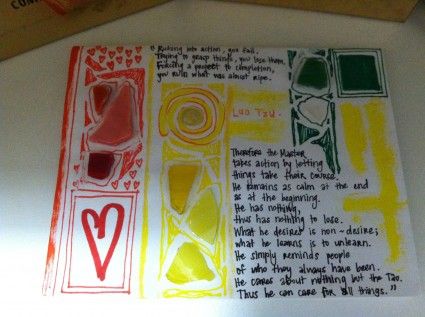6 Key Lessons from Lao Tzu Poem
Key Lessons from Lao Tzu Poem
Danielle made this card for me over the summer at a time when I was working probably “too hard” on a few projects.
The card features a beautiful poem by Lao Tzu:
Rushing into action, you fail.
Trying to grasp things, you lose them.
Forcing a project to completion,
you ruin what was almost ripe.Therefore the Master takes action
by letting things take their course.
He remains as calm at the end
as at the beginning.
He has nothing,
thus has nothing to lose.
What he desires is non-desire;
what he learns is to unlearn.
He simply reminds people
of who they have always been.
He cares about nothing but the Tao.
Thus he can care for all things.
I’ve referred to this poem often over the past few months when I felt myself grasping for control of projects. Any time you’re feeling stressed with work, with a relationship, or any other situation, read this poem. It brings calmness and helps us surrender.
Earlier this week, I discussed this poem with a few friends I love and respect. Each person provided insights as to how the poem speaks to them. We came up with several key takeaways from this poem:
6 Key Lessons from Lao Tzu Poem
- Trees don’t rush, they still grow. Water doesn’t rush, it still flows. We are like nature, rushing is not needed.
- Help other people see themselves as light and love.
- Relinquish control and surrender to God and/or the Universe. (Thank you for this one, my dear friend, PM)
- Clinging to current and/or future possessions (money, objects, ideas) leads to unneeded suffering.
- Be open minded and humble with what you think you know
- Once you realize there is a larger force at work, you can be at peace.

Beautiful poem and a beautiful assessment.
I think we are not “like nature” but rather we are nature. When we allow ourselves to be open to the deep love that exists inside of all of us, we find real, sustainable happiness. This is a process of subtraction, not of addition. We are born with everything we need to be truly happy. We add ideas and concepts, create attachments to objects and to people with the intent of filling ourselves with things that will gratify us. Clear your mind of these distractions and allow your natural energy to fill your mind and your heart and you will experience the beauty of life, the beauty of yourself and the beauty in others.
@Pat, thank you for your thoughtful comment. So well put. We are not like nature…. we are nature. Despite what consumerism tells us, we don’t need “things” to be happy. As you said, happiness lies within us if we’re able to clear our minds from distraction. How can this be accomplished? I think the first step is in awareness. If we’re aware of the fact that our minds are distracted, we can take steps to “subtract” as you eloquently said.
I try to clear my mind from distraction by practicing yoga and meditating/praying. What are your methods for clearing your mind and allowing beauty and love to shine through?
Tim,
Great post as always. Lao Tzu is brilliant and I hope to read the Tao de Ching in the near future. More importantly, I hope to use it as a meditation tool and really include the awesomeness that he taught into life’s everyday practices. That being said, hearing quotes and reading posts like these I feel like I have already started.
I love “what he desires is non-desire.” To me, it means, “what one desires is oneness and presence in the moment.”
@Brian, thank you for your thoughtful insight, my friend. It sounds like your personal definition of the Tao is “oneness and presence in the moment.” If you substitute “the Tao” with this phrase at the end of the poem, it reads:
“He cares about nothing but oneness and presence in the moment.
Thus he can care for all things.”
Now that is pretty cool 😉
I like this dialogiue! Here’s something I came across today that seems to fit in with this topic:
Prayer of an Anonymous Solider of the Confereracy:
I asked God for strength, that I might achieve – I was made weak, that I might learn humbly to obey.
I asked for help that I might do greater things – I was given infirmity, that I might do better things.
I asked for riches, that I might be happy – I was given poverty, that I might be wise.
I asked for all things, that I might enjoy life – I was given life, that I might enjoy all things.
I got nothing that I asked for – but everything I had hoped for.
Despite myself, my prayers were answered. I am, among all men, most richly blessed!
@Bob, Really enjoyed this prayer, thank you. Where did you find this? I especially like how the soldier wraps the poem up in the last few lines: “I got nothing that I asked for — but everything I had hoped for.” In the end, he realizes he’s blessed — not because of the superficial things he asked for (and did not receive), but because of the way in which he was humbled and because of the lessons he learned.
Reminds me of the phrase: “Some of God’s greatest gifts are unanswered prayers.”
What’s your main takeaway from this prayer?
Makes me think of the word I try to come back to every day, in everything I do: Patience.